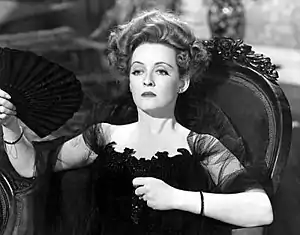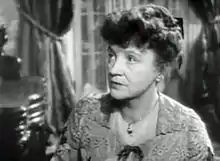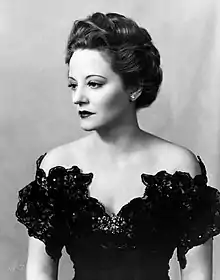The Little Foxes (film)
The Little Foxes is a 1941 American drama film directed by William Wyler. The screenplay by Lillian Hellman is based on her 1939 play The Little Foxes. Hellman's ex-husband Arthur Kober, Dorothy Parker and her husband Alan Campbell contributed additional scenes and dialogue.[3]
| The Little Foxes | |
|---|---|
.jpg.webp) Theatrical release poster by William Rose | |
| Directed by | William Wyler |
| Produced by | Samuel Goldwyn |
| Screenplay by | Lillian Hellman |
| Based on | The Little Foxes by Lillian Hellman |
| Starring | Bette Davis Herbert Marshall Teresa Wright |
| Music by | Meredith Willson |
| Cinematography | Gregg Toland |
| Edited by | Daniel Mandell |
Production company | |
| Distributed by | RKO Radio Pictures |
Release date |
|
Running time | 115 minutes |
| Country | United States |
| Language | English |
| Box office | $2.1 million (US rentals)[2] |
Plot
Southern aristocrat Regina Hubbard Giddens (Bette Davis) struggles for wealth and freedom within the confines of an early 20th-century society where fathers only considered sons as legal heirs. As a result, her avaricious brothers, Benjamin (Charles Dingle) and Oscar (Carl Benton Reid), are independently wealthy, while she is financially dependent upon her sickly husband, Horace (Herbert Marshall), who has a severe heart condition.

Oscar, having married and maligned the sweet-souled, now alcoholic Birdie (Patricia Collinge) to acquire her family's plantation and its cotton fields, now wants to join forces with Benjamin to construct a cotton mill. They approach their sister, needing an additional $75,000 to invest in the project. Oscar initially proposes a marriage between his son, Leo (Dan Duryea), and Regina's daughter, Alexandra, (Teresa Wright) – who are first cousins – to get Horace's money; Horace and Alexandra are repulsed by the suggestion. When Regina asks Horace outright for the money, he refuses. She tells him his refusal is unimportant since he will die soon, a day she eagerly awaits. Alexandra, overhearing, the conversation, is distraught. She then comforts her father after Regina leaves the room.

After Horace's refusal, Ben and Oscar pressure Leo, who works at the bank, to steal Horace's railroad bonds from his personal security box to obtain the additional sum needed to construct the mill. After an impromptu trip to the bank, Horace discovers the bonds missing from his security box and informs Regina. Realizing her brothers had Leo steal the bonds, Regina schemes to blackmail them for a larger share in the mill.
Horace immediately states he is changing his will, leaving Alexandra everything except the railroad bonds, which he will claim he freely lent to Leo. This will thwart Regina's attempt to blackmail her brothers and deny her an ownership stake in the mill. Birdie summons the courage to tell Alexandra not to marry the wrong man (i.e. her son, the repugnant Leo) and suffer the consequences for a lifetime. Oscar overhears this and, after Alexandra is out of earshot, slaps Birdie hard.
.jpg.webp)
Regina argues with Horace. When he suffers a heart attack, she makes no effort to retrieve his medication. Horace staggers up the stairs to get it but collapses halfway up. Regina now rushes to him, calling for the servants to take him to his room and go for the doctor. The scene cuts to Horace on his deathbed, surrounded by family, a doctor and servants. Horace dies, leaving no one to contradict Regina if she accuses her brothers of theft. She thus blackmails her brothers, demanding 75% ownership of the mill business, forcing them to accept her demands.
Alexandra overhears this. After her uncles leave, she confronts her mother about her father's death. Regina denies any wrongdoing, but Alexandra is skeptical. Alexandra then states the importance of not idly watching people do evil. Regina tells her daughter there is nothing she can do to stop her from leaving the household, while hoping that Alexandra stays. Alexandra leaves with journalist David Hewitt (Richard Carlson). Regina is left wealthy, but completely alone.
Cast
- Bette Davis as Regina Hubbard Giddens
- Herbert Marshall as Horace Giddens
- Teresa Wright as Alexandra Giddens
- Richard Carlson as David Hewitt
- Dan Duryea as Leo Hubbard
- Patricia Collinge as Birdie Hubbard
- Charles Dingle as Ben Hubbard
- Carl Benton Reid as Oscar Hubbard
- Jessica Grayson as Addie (as Jessie Grayson)
- John Marriott as Cal
- Russell Hicks as William Marshall
- Lucien Littlefield as Manders
- Virginia Brissac as Mrs. Hewitt
- Terry Nibert as Julia
- Henry 'Hot Shot' Thomas as Harold
- Charles R. Moore as Simon
- Hooper Atchley as Party Guest (uncredited)
- Al Bridge as Dawson (uncredited)
- Tex Driscoll as Bank Customer (uncredited)
- Jesse Graves as Headwaiter (uncredited)
- Lew Kelly as Train Companion (uncredited)
- Henry Roquemore as Depositor (uncredited)
- Kenny Washington as Servant (uncredited)
Production

The title comes from Chapter 2, Verse 15 in the Song of Solomon in the King James version of the Bible, which reads, "Take us the foxes, the little foxes, that spoil the vines: for our vines have tender grapes."[4] The same passage also inspired the title of an unrelated film, Our Vines Have Tender Grapes.
Tallulah Bankhead had received critical acclaim for her performance in the 1939 Broadway production of Hellman's play, but director William Wyler, who previously had teamed with Bette Davis on Jezebel and The Letter, insisted on casting her in the lead role instead. Producer Samuel Goldwyn agreed, since none of Bankhead's films had been box office hits. (Coincidentally, Davis had recreated on film another of Bankhead's Broadway roles, Judith Traherne in Dark Victory.) However, Davis was reluctant: "On The Little Foxes I begged the producer, Samuel Goldwyn, to let Tallulah Bankhead play Regina because Tallulah was magnificent on the stage. He wouldn't let her."[5] Initially Jack L. Warner refused to lend Davis to Goldwyn, who then offered the role to Miriam Hopkins.[6] When Wyler refused to work with her, Goldwyn resumed negotiations with Warner and finally secured Davis for $385,000. As a contract player at Warner Bros., Davis was earning $3,000 a week, and when she discovered how much Warner had received for her appearance in Foxes, she demanded and ultimately received a share of the payment.[4]
Wyler encouraged Davis to see Bankhead in the original play, which she did despite major misgivings. She later regretted doing so because after watching Bankhead's performance and reading Hellman's screenplay she felt compelled to create a totally different interpretation of the role, one she didn't feel suited the character. Bankhead had portrayed Regina as a victim forced to fight for her survival due to the contempt with which her brothers treated her, but Davis played her as a cold, conniving, calculating woman wearing a death mask of white powder she insisted makeup artist Perc Westmore create for her.[6]
In her autobiography, A Lonely Life, Davis gave a different version about having to see Bankhead in the play. "A great admirer of hers, I wanted in no way to be influenced by her work. It was Willie's intention that I give a different interpretation of the part. I insisted that Tallulah had played it the only way it could be played. Miss Hellman's Regina was written with such definition that it could only be played one way."[7] "I had to do that part exactly the way Tallulah did it, because that's the way Lillian Hellman wrote it. But I was always sad that Tallulah couldn't record Regina from the theatre, because she was marvelous."

Charles Dingle, Carl Benton Reid, Dan Duryea, and Patricia Collinge all reprised their critically acclaimed Broadway performances. Critics preferred Bankhead's rendition of the role to Davis's, though the supporting cast was highly praised. The character of David Hewitt was not in the original play. Hellman created him to add a second sympathetic male to stand alongside Horace among all the venomous Hubbard men.
Davis and Wyler frequently fought during filming, about everything from her appearance (Wyler thought she looked like a Kabuki performer, but Davis wanted to look older than her age as the part was written for a 40-year-old) to the set design (which Davis thought was far too opulent for a family supposedly struggling financially) to her interpretation of the role (Wyler wanted a more feminine and sympathetic Regina, akin to Tallulah's interpretation). Davis had yielded to Wyler's demands during production of The Letter, but this time she held her ground. Not helping the situation was the fact Los Angeles was experiencing its worst heat wave in years, and the temperature on the soundstages regularly rose above 100 degrees. Davis finally walked off the picture. "It was the only time in my career that I walked out on a film after the shooting had begun," she later recalled. "I was a nervous wreck due to the fact that my favorite and most admired director was fighting me every inch of the way ... I just didn't want to continue."[4] The actress retreated to her rented house in Laguna Beach and "flatly refused to come back to work. It took a little courage, to say the least. Goldwyn had it in his power to sue me for the entire cost of the production."[4] A week later she returned to the set after rumors she would be replaced by Katharine Hepburn or Miriam Hopkins began to circulate, although Goldwyn was not about to bear the expense of scrapping all the footage with Davis and refilming the scenes with a new actress.[6] Even though the film was a critical and commercial success and nominated for nine Academy Awards, she and Wyler never worked together again.[3][4][6] The film premiered at Radio City Music Hall in New York City. The New York Times reported it was seen by 22,163 persons on its opening day, setting what was then an all-time attendance mark for a normal opening day at the theatre.[8]
In 1946, Hellman wrote the play Another Part of the Forest, a prequel to Foxes. It was adapted for the screen in 1948.
In 2003, the character of Regina Giddens, played by Davis, was ranked No. 43 on the American Film Institute list of the 50 Best Villains of American Cinema.
Critical reception
In his review in The New York Times, Bosley Crowther observed,
Lillian Hellman's grim and malignant melodrama... has now been translated to the screen with all its original viciousness intact ... [It] leaps to the front as the most bitingly sinister picture of the year and as one of the most cruelly realistic character studies yet shown on the screen ... Mr. Wyler, with the aid of Gregg Toland, has used the camera to sweep in the myriad small details of a mauve decadent household and the more indicative facets of the many characters... Miss Davis's performance in the role which Talluluh Bankhead played so brassily on the stage is abundant with color and mood... she does occasionally drop an unmistakable imitation of her predecessor... Better than that, however, are the other members of the cast. Charles Dingle as Brother Ben Hubbard, the oldest and sharpest of the rattlesnake clan, is the perfect villain in respectable garb. Carl Benton Reid as Brother Oscar is magnificently dark, sullen and undependable. Patricia Collinge repeats her excellent stage performance... The Little Foxes will not increase your admiration for mankind. It is cold and cynical. But it is a very exciting picture to watch in a comfortably objective way, especially if you enjoy expert stabbing-in-the-back.[9]
Variety said,
From starring Bette Davis down the line to the bit roles portrayed by minor Negroes the acting is well nigh flawless ... Marshall turns in one of his top performances ... On top of the smooth pace, Wyler has handled every detail with an acutely dramatic touch.[10]
Box office
The film was popular at the box office but because of the favourable terms Sam Goldwyn enjoyed with distributor RKO, RKO recorded a loss of $140,000 on the film.[11]
Awards and nominations

The film received 9 Academy Award nominations and no wins, setting a record later tied by Peyton Place in 1957. The record was surpassed by The Turning Point in 1977, which received 11 nominations without a win; The Color Purple earned the same distinction in 1985.
| Award | Category | Nominee(s) | Result |
|---|---|---|---|
| Academy Awards | Best Picture | Samuel Goldwyn | Nominated |
| Best Director | William Wyler | Nominated | |
| Best Actress | Bette Davis | Nominated | |
| Best Supporting Actress | Patricia Collinge | Nominated | |
| Teresa Wright | Nominated | ||
| Best Screenplay | Lillian Hellman | Nominated | |
| Best Art Direction–Interior Decoration – Black-and-White | Stephen Goosson and Howard Bristol | Nominated | |
| Best Film Editing | Daniel Mandell | Nominated | |
| Best Scoring of a Dramatic Picture | Meredith Willson | Nominated | |
| National Board of Review Awards | Top Ten Films | The Little Foxes | Won |
| Best Acting | Patricia Collinge | Won | |
| Bette Davis | Won |
Radio adaptation
The Little Foxes was presented February 11, 1946, on Screen Guild Theatre. The 30-minute adaptation starred Davis, Wright and Dingle in their roles from the film.[12] Tallulah Bankhead (reprising her Broadway role) also gave a radio adaptation.
In popular culture
In 1975, the eighth episode of the ninth season of The Carol Burnett Show featured a spoof of the film called "The Little Foxies", with Carol Burnett as "Virgina Grubber Gibbons", Roddy McDowall as "Morris Gibbons", Harvey Korman as "Bosco Grubber", Vicki Lawrence as "Burly Grubber" and Tim Conway as "Theo Grubber".[13]
References
- "The Little Foxes: Detail View". American Film Institute. Retrieved April 13, 2014.
- "All-time Film Rental Champs". Variety. October 15, 1990. p. M162 to 166.
- Landazuri, Margarita. "Articles: The Little Foxes (1941)". Turner Classic Movies. Retrieved January 6, 2020.
- Stine and Davis 1974, pp. 148–153.
- Staggs, Sam (23 June 2001). All About All About Eve: The Complete Behind-the-Scenes Story of the Bitchiest Film Ever Made!. St. Martin's Press. ISBN 978-1466830431 – via Google Books.
- Higham 1981, pp. 211–212.
- Davis 1962, p. 207.
- "Film record set by 'Little Foxes'; 22,163 Persons Saw Movie at Music Hall on Thursday, a New Opening Day Mark." The New York Times, August 22, 1941.
- Crowther, Bosley. "The Little Foxes (1941): 'The Little Foxes,' Full of Evil, Reaches the Screen of the Music Hall." The New York Times, August 22, 1941.
- "Review: The Little Foxes". Variety. August 22, 1941. Retrieved January 6, 2020.
- Jewell 2012, p. 254.
- "Those Were the Days". Nostalgia Digest. 35 (2): 32–39. Spring 2009.
- Little Foxies. CBS. The Carol Burnett Show. November 1, 1975 – via YouTube.
Bibliography
- Davis, Bette (April 4, 2017). The Lonely Life: An Autobiography. New York: Hachette. ISBN 978-0316441292.
- Higham, Charles (December 1, 1982). Bette: The Life of Bette Davis. New York: Macmillan. ISBN 978-0440106623.
- Jewell, Richard B. (2012). RKO Radio Pictures: A Titan is Born. Berkeley: University of California Press. ISBN 978-0520271791.
- Stine, Whitney; Bette Davis (1974). Mother Goddam: The Story of the Career of Bette Davis. New York: Hawthorn Books. ISBN 0-8015-5184-6.
External links
| Wikimedia Commons has media related to The Little Foxes (film). |
- The Little Foxes at the American Film Institute Catalog
- The Little Foxes at IMDb
- The Little Foxes at AllMovie
- The Little Foxes at Rotten Tomatoes
- The Little Foxes at TV Guide
- The Little Foxes at Reel Classics
- The Little Foxes on Screen Guild Theater: August 6, 1945
- Nighttime exterior of Radio City Music Hall, with marquis indicating that The Little Foxes starring Bette Davis, Herbert Marshall and Teresa Wright, is playing there.